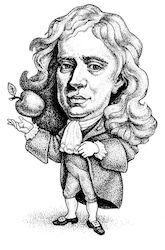Sir Isaac Newton (1642–1726) was an English mathematician, physicist, astronomer, theologian, and author. He is widely recognized as one of the most influential scientists of all time.
His book, Philosophiae Naturalis Principia Mathematica (Mathematical Principles of Natural Philosophy), first published in 1687, laid the foundations of classical mechanics.
While the scientific community reveres his brilliance, his peers reviled him for his petty mean spiritedness. The inescapable truth is that Isaac Newton wasn't the rosy individual our elementary teachers portrayed him to be. Cold and calculating, cunning and quick-tempered, he was not a nice person.
But, he was a genius in the truest sense of the word. His thinking and writing about mechanics and motion are still revered today, nearly four hundred years later. Among the most prolific are Newton's Laws of Motion. Simply stated, they are as follows:
First Law: An object at rest remains at rest unless acted upon by a force.
Second Law: The acceleration of an object is directly proportional to the net force exerted.
Third Law: For every action, there is an equal and opposite reaction.
These laws are not just timeless; they are limitless and apply to music education just as much as they apply to physics and science.
Think about it.
First Law: An object at rest remains at rest unless acted upon by a force.
When you first encounter your students, they are an object at rest. They come to you after being dormant academically and musically for 8-12 weeks. You are the force that brings them from inactive to active.
Second Law: The acceleration of an object is directly proportional to the net force exerted.
It takes an incredible amount of force from you to achieve incredible things with young people. I have always said, teaching music is a soul-sucking, life-draining profession because it is a soul-enriching, life-changing experience.
Third Law: For every action, there is an equal and opposite reaction.
For every action a student takes with you, there is an equal and opposite reaction that they are not taking without you. For example, every time they are at rehearsal, they are not on the streets. Every time they are with you, they are not with someone who might bring them harm. Every time they have an instrument to their face, they are not putting drugs, alcohol, or a vape pipe to their lips.
As you transition from the outdoor to the indoor, the field to the gym, or classical literature to holiday music, it's worth taking a moment to reflect upon Sir Issac and his laws of motion and remember that...
You are a force.
Have a great week.

